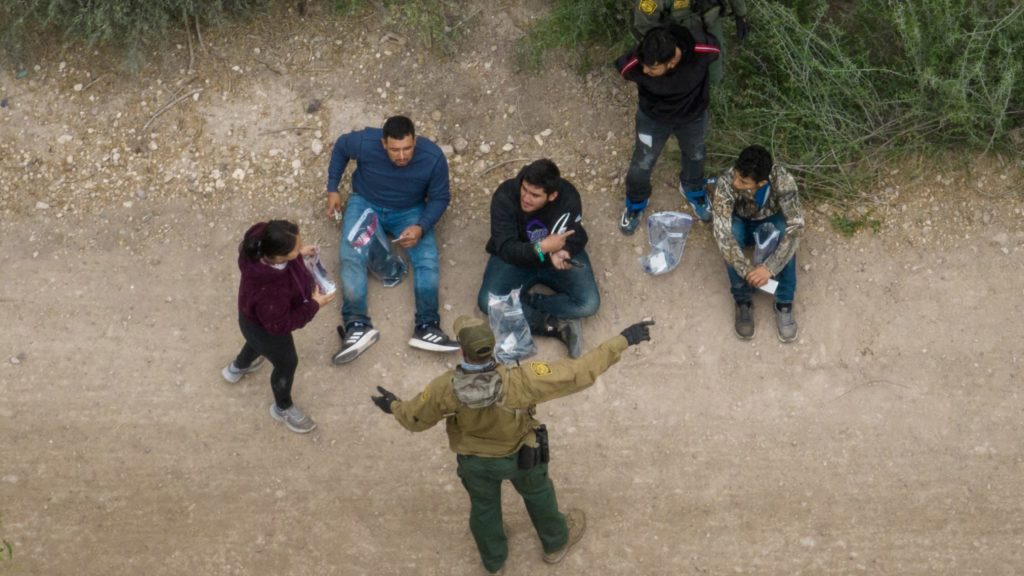Gov. Greg Abbott, R-Texas, signed an immigration bill into law Dec. 18 that makes it a state crime for unauthorized migrants to cross into Texas from Mexico. Catholic organizations including the Texas Catholic Conference of Bishops have opposed the legislation.
The bill, Senate Bill 4, was passed by Republican majorities in both the state House and Senate in November, making unlawfully crossing Texas' international border a state crime separate from a federal one, granting local law enforcement officials power to arrest migrants suspected of lacking legal authorization to be in the U.S.
The legislation forbids such arrests at schools, places of worship, health care facilities or designated SAFE-Ready facilities, which the state operates for those who have experienced sexual assault.
Supporters of the legislation argue it would combat unauthorized entry into the state by empowering law enforcement, while opponents argue it is unconstitutional and inhumane.
In a statement, Abbott argued Democratic President Joe Biden has neglected the border and left Texas to "fend for itself," claiming the legislation "will help stop the tidal wave of illegal entry into Texas, add additional funding to build more border wall, and crackdown on human smuggling."
The legislation faces legal challenges, as federal law already makes it illegal to enter the U.S. without authorization. Most portions of a similar 2010 Arizona law were later struck down by the U.S. Supreme Court.
El Paso County, alongside the American Civil Liberties Union and the Texas Civil Rights Project filed a lawsuit Dec. 19 in federal court in Austin challenging the measure.
Dylan Corbett, executive director of the Hope Border Institute, a group that works to apply the perspective of Catholic social teaching in policy and practice to the U.S.-Mexico border region, called the new law "inhumane, immoral, and unconstitutional" in a statement.
"Its only aim is to criminalize people seeking safety at the border and instill fear in families throughout Texas," Corbett said. "The day it goes into effect, it will disastrously make every Texan less safe by eroding fundamental community trust with law enforcement."
Corbett argued the Biden administration "needs to take immediate action to stop this and every action being taken by Governor Abbott to weaponize our border and cynically deploy our peace officers against the vulnerable."
White House press secretary Karine Jean-Pierre said at a Dec. 19 press briefing that "this is an extreme law that will not and does not make the communities in Texas safer."
"This is not who we are as a country," Jean-Pierre said. "This is not who we should be as a country. Communities should not be individually targeted and put into harm's way. And this is what we're seeing."
Melissa Lopez, executive director of El Paso's Diocesan Migrant and Refugee Services, said in a statement that Texas "continues its assault on people of color."
"The law is unconstitutional, inhumane, and an overly broad encroachment of federal immigration authority," Lopez said. "The State's assault on migrants has resulted in far too many deaths. Countless people will lose their lives, end up in jail, and be deported before legal challenges invalidate the law. The enforcement of this law will come at the expense of human dignity and human rights. The State of Texas is undertaking more and more dangerous tactics at every turn with no sign of letting up. We must protect anyone impacted or affected by S.B. 4. We must ensure they have access to legal representation, understand their rights, and know how to assert them when confronted by law enforcement."
In a statement, Sarah Cruz, policy and advocacy strategist for border and immigrants' rights at the ACLU of Texas, said in a statement that "Texas border communities have been forced to live in an environment of increased harassment by law enforcement for years."
"S.B. 4, one of the most radical and anti-immigrant bills in the country, will undoubtedly lead to more rights violations and instill fear in Black, Brown, and Indigenous communities and all people of color throughout the state," Cruz said. "The bill violates international and federal law and interferes with the asylum process, potentially causing further trauma and distress to people seeking asylum, including families and children. Texans deserve to have their real needs met, not more cruelty that will further harm our communities."
Jennifer Allmon, executive director of the Texas bishops' conference, called the legislation "grossly imprudent" after its November passage and said it "could have deadly consequences for innocent migrants."
The new law is scheduled to take effect in March.

